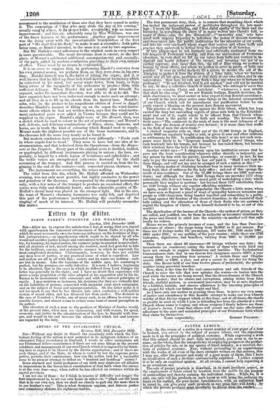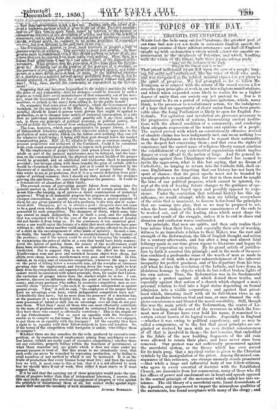Si
Aim of articles fer sale; ein.;.1,n any specie,s of hirea , m,screceiv,atl *- trine of political economy. Now, without pretendhgt4 aeqtmmtance with the works of all evee of the more el/intent writecnkon, ramenee_, this I may say, after the perusal and study Of a geed pf, -OA haye no recollection of such a doctrine systematically,,, Ejtirpeat it to be only an empirical opinion. At all even* li,tuinefili .,p,regirdingit ilSan erronus,one. 1414n
The aisleecpauper products is described, in its .4nin
...; the employment of funds raised by taxation from the fuhfic for,the of underselling and thereby ruiningj ts 4iIa1 tr*.?Tetit said, can miry sell his products.? Ana etfttal, the poor- - -,tr,.019ge9.44.i_AVY4 w c tee private' p .nanEnapagnen , Sin—In the course of n notice a recent number of your Range of i telly in Ireland, you advert to the subject of pauper labour, and the,Ohjections
made to it on the rinekples,ol,pohtical econemy, ezpressing,e wish
that this subject s be.,Fmre fully investignteth.-,mcapertia, to ngto as-
cuts', on the whO1e,„ the inexpediency of empipppg,pmapersui the wane,- 1
1 1. ,1117
;
4 conclusipn disproves the premises. It would be
a deraonstraho a a of their falsity-.
, The, avowed reason oCpreventlng pauper labour -from coming into the
.general market is lest it should ewer 'the price of certain products. But 154!0t this—theAeping up of prices-,tt direct counteraction of _industrial Ilugress,? Wht4 wall -industrial progress but progres.s in cheapening ? To .cheapen commoditias;,to enable every man to obtain a, greater quantity of Ahem for any giv,en.qoantity of his owmproduets, is.the very mm of eeeno- lineal skill. Cheapness, per Se, is alWays a good ; Cheapness does not cease to be n goodeven when effected by excessive eemmetition, and the hardships .generoted by such competitiou. The cheapness of shirts, which some time -ego :roused se much indignation, was in itself a good, . and the suffering that was conjoined with if in the case of the poor needlewomen of- London did pot hinderit,from.being so. To the ,consioners it was unmixed good: many a one wpahlenjoythe,luxury of a -shirt that must otherwise have gene without it ; while minty. another could employ the saving effected !in the price .of-ashirt ift; the eavosnigement of otherkinds of-industry. bastioh a_SItee, tao libanhts,_ the heneft _M. the onlisumer is OPNutex1Wane.ed by the misery, of the producer ; and if the misery could be saved by foregoing the beneht-7-if, maiuMining7t4Pricelf rsliirts at a rate that weuldhave fairly neurpne- the.. labour of making them, the misery. of the..iaeedlewemeti.could A been obviatcd—thea,..perhaps, such an -upholding of prices, might be ;vindicated. But to suppose this, is to mistake the- effect for the cause. itedlewomemi yew hot ;poor, and mrsetelied: because shirts were cheap, but WescieheaP-. hiecatise-.11tedlestoosen.were.,poor and wretched. In this, in ea my emu Wien, whenever the wages were point of fa mg below a reasonab e rate, all the overplus of labourers g,,inte the employment, and forcing down the wages might be'ltept firass tlurcOmpetitien, and supported at the public expense. If such a pro- , maim would he cmisistentwith sound prineiple, .then, for aught,thatl.kaow, the egrreaRBian:-.0 Minffer labour from Jthe .market might be so too. I can, )mytavery,dixoyerzhe difference affecting the pond at issue between the two ncases; p4 aliena producer who suffers by exoessi,ve..competition limy as rea- sonably claim "protection "—for such it is—against independent us against -pauper rivals. "But,” it will be said, " the,employers.of the pauper labour have an advmitage even here, which independent oompetitors. have Pot." Ondoubtedly they have; but no more thau the possessor of a machine has, or the possessor of a more,ftuithil field, or mine. For that. matter, every man possessed of. talent or skill has an advantage over all that do not pos- 01368 these. What thew? must all those who caumost,effectually contribotc .1te the mass of preduete, useful to mankind he restrainedfrom doing SP, lest they hurt those who cannot so effectually contribute? This is the stupid cry of ,00r, Preteetipaists "Put us upon is bound with the foreigner— enable us to compete on_fsirterms.'? Batavia) boun or who ever engaged, to put them on an equality with the foreigner ?All the equality they have a nght to is, _equalit with their fellow-subjceti io laws and taxation. Or, ifihe tern* elf 'the:eeni,étition With foreigners is unfair, who 'obliges 'them -Whethei' there ai.e-atv remedies for the evils produced by excessive com- petition; or by contraction of employment arising from machinery Or cost- less labour, (which are really cases of excessive competition,) whether there are any remedies, properly falling within the functions of government, or what these remedies are, are -points which it does not come under my present purpose to treat of Bait this seems to Me abundantly cleat, that such tiih 'can never be remedied by repressing production, ' or by failing to avail oureelres'of any method by which it Can be -increased: It is on the friallii'ofinialitetion that every 'human 1561i/unit live; and tern the Matter how we will, it must come to this at last, that if A is not allowed- to work lest' lati'ithetild drive B out of work, then either A must starve or B must antitiert,
I.
in.
so1ence9- 'wit WI; ifIlePRAWraF4 iMI8u 168.,Apoic n ru vra c'R" fiAFAR.). PrciOAMEVK /PE Aran ootrir.,
qw
cgitiniA
o va Yqu
d - OLLIC IRRPM
'PEI.K.P ■ 2??.. .
.aleg,reeras .a, . 4Aye,overy manufacturer of that commodity out of the war. -e ,nn,is(the , pyerninent. for fear of consequence absttiu from using such k 'iniachine; or, ..‘W , 'e,10;sillie Same) from selling.it, for the public beuefit ? . .4„. ps,„itiRppv,pg .., 4 p*eipiece of machinery, which the Government in ust _RI tam, [as AmiimeNrery at the Mint, or the block machinery. at Ports- ..thaald.. .Nkto possess waste powers that ini,ght be applied to . ton, so ss• to some article ef universal consumption, to a rate t tioprdivid* rtutiKktirer could possibly sell it at,—liere again, I -asks .IRPICEill og , -oreig,tiolitkoi economy, or political justice, that should prohibit inc overninent from undersellimg the imumfacturer ? The cas .13 vAverco9lickpmpyt,, ppi4niate2 tO liauper labour, is that of in, 40Pli, 1 414ourets App limc, otherwise fuseless spare time to the proutichpa, Ipioic iwticia, C- e labour ,cpStS nothing) they um sell for vilkataver.g,tilibiiug ; it itheir gum though below the market ARP4er4ii!Ig,P$19." liar (4d es to this,cnie as common among the peasant' proprietors and métayers iif 4h, 0.,ntiii4t. Could it be consistent witkpven amyl-economical pripejpls m.reprels such proanction := Ilyte-cmpIypieut Of pauper1Iaur„(Mid prison labour is the same) the whole-nr . partof the paupers Maintenanee,may,be_defrayed, and the taxa- tion on j1pqnunuuityleened, the Physical aaa samal health of the-pauper would-J njopul, itud an additional rind wholesome cheek to pauperism ..provi ,„ A.,419 along with those .licaeftt a the price of certain articles !Pt on*. IT chnspoiR froithe community' yustas it would be cheapened by the Aliscoyer oof P. Cilia:9 -.ern-must cot make use of pauper labour. 11uly, this sePPla..ttfia.!!, :roue, that if it is a correct deduction from pull- 14iyiet -cipteiAtt.jp_sa _ then I shouhl say that, instead of the premises
.
.PAlvillillif9f,*
efg
t 0;44 s „ 44.1.s proaitC bh CII
.
T.ftr, queathed to the public a machine by which 'botS for instance—could be lowered' to such, a
Aoaomt. Bonzams.



























 Previous page
Previous page